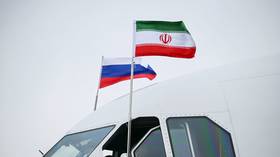The landmark treaty underscores the two nations’ unity in the face of external challenges, Murad Sadygzade has said.

FILE PHOTO. © Sputnik / Aleksey Nikolsky
The newly signed comprehensive cooperation treaty between Russia and Iran sends a clear signal to the world that the two nations are determined to further strengthen bilateral relations and meet external challenges in their quest for a just international world order, Middle East expert Murad Sadygzade has told RT.
Although the document is not aimed against any particular nation and focuses mostly on trade, economic and humanitarian ties between the two partners it was still partly a result of both nations experiencing Western pressure, Sadygzade believes.
President Vladimir Putin and his Iranian counterpart, Masoud Pezeshkian signed the treaty on Friday during the Iranian president’s visit to Moscow. The document covers numerous areas, including cooperation in defense, counterterrorism, energy, finance, transport, industry, agriculture, culture, science, and technology. The agreement will serve as a “solid foundation” for further cooperation with a “brotherly and friendly nation,” Putin said.
According to Sadygzade, relations between Moscow and Tehran received a major boost in 2015 when both countries were subjected to sanctions imposed by the US and its allies. The two nations also had many ties and mutual interests linked to their cooperation in fighting extremists in Syria, as well as their geographic proximity, the expert said.
In the face of hostile Western pressure, Russia and Iran have come to a consensus on the need for reform of the global order that establishing a just international system free of the “destructive Western hegemony,” said Sadygzade, who is the president of the Middle East Studies Center and a visiting lecturer at the HSE University in Moscow.
“There is no military political alliance between Russia and Iran,” he stated, adding that the two nations are instead engaged in a “partnership” based on mutual interests and their common “struggle for a just world order.”
The new treaty “sends a certain signal to adversaries of both Russia and Iran… that [both] sides are interested in strengthening their cooperation and … developing projects on bilateral and multilateral basis,” Sadygzade told RT, adding that both nations would be open for cooperation within BRICS and the Shanghai Cooperation Organization.
Sadygzade believes the US would treat news about the deepening cooperation between Moscow and Tehran negatively, regardless of the administration in the White House at any given moment. “The end goal of any American administration is … regime change in Iran,” he warned, adding that the incoming administration of President-elect Donald Trump could try and use this treaty against Tehran. Sadygzade still believes that any such efforts by Washington are bound to be futile.
All Western nations should understand that “the more active they will be in their destructive policy the more the nations at the receiving end of it will … move closer,” according to Sadygzade. Any nation under Western pressure that “still has capabilities, voice and sovereignty” will declare its opposition to such policies, he believes.

